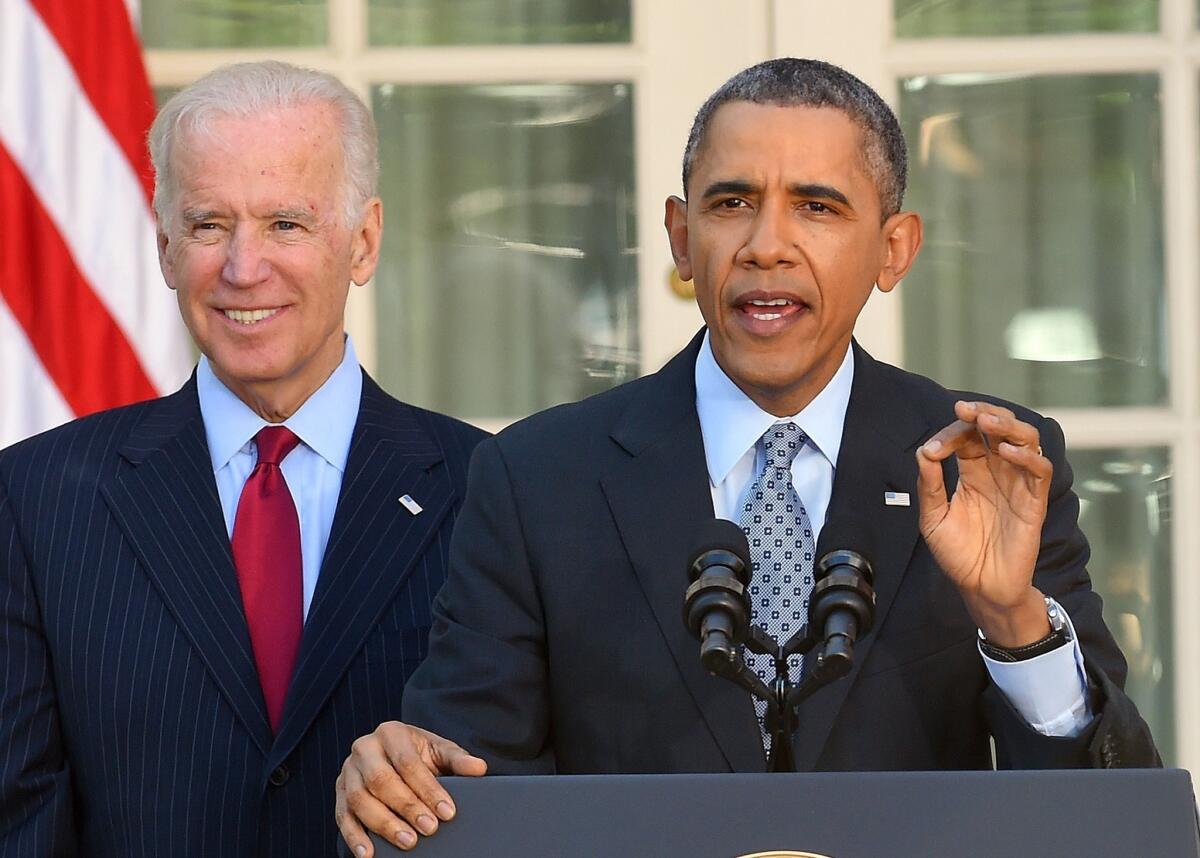Is Obamacare too big to fail?

When Obamacare’s first open-enrollment period ended last week, the tally was impressive: 7.1 million Americans signed up for insurance on federal and state exchanges by the March 31 deadline, several million more signed up for Medicaid and a whole lot of under-26 Americans got covered by their parents’ plans.
Those numbers represent a significant political victory for Democrats, making it highly unlikely that Republicans will be able to deliver on their promise to repeal the law.
“You’re not going to turn away 7 or 10 million people from insurance coverage,” crowed Sen. Dick Durbin (D-Ill.), the No. 2 Democrat in the Senate. “Doesn’t work anymore.”
That doesn’t mean Obamacare is guaranteed to succeed. The program still faces a series of difficult tests — most important, keeping costs under control so insurance premiums don’t soar in coming years.
And the program is certain not to be universally popular with its participants. Just think: Millions of newcomers to health coverage are about to join the rest of us in those frustrating battles with insurers.
But the enrollment numbers do mean that the main argument Republicans hurled against the law — that it was doomed to collapse — is looking weaker than ever.
They also mean that Democrats now have a chance to shift the healthcare debate from whether the law should be repealed to how to improve it. Recent polls have found that between 53% and 71% of respondents (depending on how the question is worded) favor keeping the law and fixing it.
The White House has already tinkered with the law administratively to soften some of its most unpopular provisions, enraging Republicans, who have accused President Obama of unconstitutional actions to save his most important domestic achievement. For example, the president has twice delayed implementing the requirement that employers with 50 or more employees offer health insurance.
And it’s not impossible that the law could be modified, with congressional approval, to scrap the mandate on companies with fewer than 100 workers.
But the biggest, most interesting change that some Democrats have proposed is a new, lower tier of health insurance policies for people who think the premiums on the standard Obamacare plans are too high.
The current version of Obamacare offers four levels of insurance — platinum, gold, silver and bronze — with many different prices. The plans are similar in the services they cover but different in the way they charge.
Platinum and gold plans charge high premiums up front, but they offer lower co-payments (the amount a patient pays for a visit to the doctor) and lower deductibles (the amount a patient pays before insurance kicks in). Bronze plans charge lower premiums but exact a higher cost later on, through higher co-payments and deductibles.
But when Obamacare enrollment started last fall, some consumers who previously held only “catastrophic” insurance — plans that cost relatively little but also don’t pay for much until a big deductible is met — complained that all the new policies cost too much up front. In response, Sens. Mark Begich (D-Alaska) and Mark Warner (D-Va.) proposed a new tier of “copper” insurance plans with lower premiums, and correspondingly skimpier coverage in terms of higher deductibles and co-payments.
Some health advocates have criticized the proposal, arguing that it would seduce thrifty consumers into low-cost policies that don’t deliver much, and could even deter patients from visiting their doctors because of the higher co-payments they would face.
But Begich, Warner and others argue that a copper plan would expand the choices available to Obamacare buyers, and that, as long as the trade-offs are clear, consumers who want a catastrophic plan ought to have that option. They point to insurance industry studies that suggest that adding a lower-price plan to the mix could drive down costs overall, by increasing the number of willing consumers and competition.
One thing Democrats aren’t proposing: changing the list of medical conditions that are covered by Obamacare policies. Economists note that one way to lower costs would be to offer plans that don’t cover, for example, maternity care or mental health care. “But that would be a minefield,” one congressional aide noted.
So what will Republicans do now?
They’re trapped in a corner of their own making. GOP leaders say their position now is to “repeal and replace” the healthcare law. But more than four years after Obamacare became law, they still don’t have a consensus proposal for what that replacement would look like.
There are plenty of conservative ideas out there, of course. Louisiana Gov. Bobby Jindal has proposed a plan that would replace Obamacare with a $100-billion fund for state insurance plans to cover people with preexisting conditions. (It would also turn Medicare into a voucher program.) Three Republican senators have proposed a plan that would give low-income taxpayers a tax credit for health insurance costs and guarantee continued coverage for people with preexisting conditions.
But if 10 million people or more have gained health insurance thanks to Obama’s long-derided law, they’re going to want to see a fully fleshed-out replacement before they jump ship. The Republicans haven’t provided one, and that’s a prescription for irrelevance.
“The debate over repealing this law is over,” Obama said last week. Maybe. But the debate over fixing the law has only just begun.
Twitter: @DoyleMcManus
More to Read
A cure for the common opinion
Get thought-provoking perspectives with our weekly newsletter.
You may occasionally receive promotional content from the Los Angeles Times.











